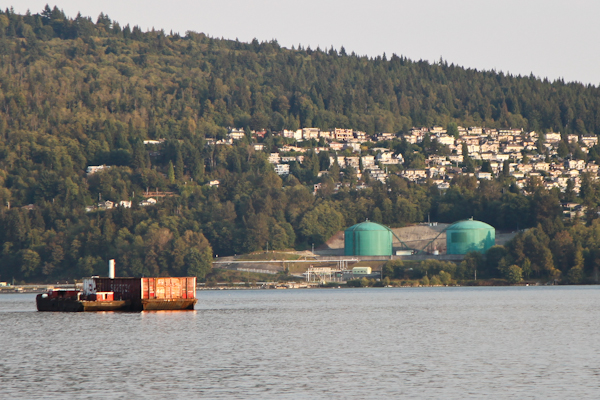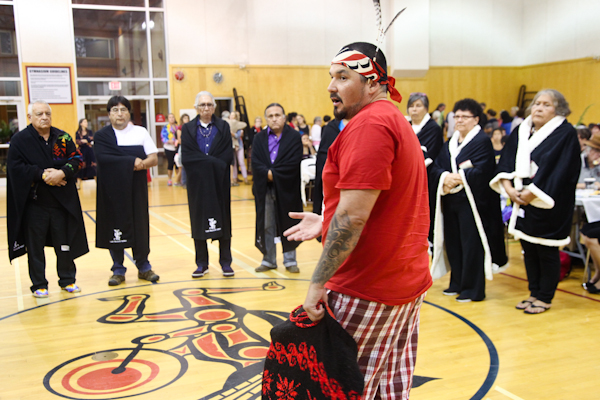Freshly fed with a wild salmon feast and stirred by drumming and anti-oilsands proclamations, a crowd of several hundred stood en masse to loudly sing Tsleil-Waututh Nation's anthem on Sunday.
Roughly 500 people crammed into the First Nation's North Shore community centre on the eve of what the band's culture and language manager Gabriel George dubbed an "historic event" -- the signing of an intertribal treaty against Kinder Morgan's proposed pipeline through southern B.C.
The International Treaty to Protect the Salish Sea was signed by nine First Nations straddling both sides of the U.S.-Canada border.
From mid-October through November, the National Energy Board will launch a series of B.C. hearings on the Trans Mountain project, starting with indigenous community input in Chilliwack, Kamloops and Victoria.
The pipeline is projected to cost $5.4 billion and pump an estimated 890,000 barrels of diluted bitumen daily over a thousand kilometres from Alberta's oilsands to Burnaby. Opponents fear the boost in daily tanker traffic and risk of ruptures could harm the environment and local economies.
"We really need to look after the land," George told the crowd, as the band's elected councillors wrapped treaty delegates in black blankets as a gesture of thanksgiving before the signing. George explained that blankets are a symbol of "sacrifice" and blessing.
The treaty is based in indigenous traditional law. It does not carry any official blessing of the federal or provincial governments, and has no legal authority under Canadian law.
"Coast Salish people stand united by our ancestral ties to each other and to the Salish Sea," the pact declares. "Now the waters of the Salish Sea and the rivers that drain into it are threatened by proposals to drastically increase shipping of oil and bitumen and the inevitable risk of oil spills.
"By affixing our signatures hereto, we the undersigned commit ourselves to doing everything in our lawful power to protect our territories from the Kinder Morgan expansion project, and any other tarsands projects that would increase the transportation of tarsands oil through our territories."
Subject of legal challenges
The treaty includes seven clauses, including a declaration that Salish ancestral laws require the protection of the sea and its tributaries from harm; that First Nations possess the "authority and duty to protect" the region; and that tankers and pipelines as currently proposed are "illegal as a matter of our ancestral laws, Canadian constitutional law, and international law on the rights of indigenous peoples."
But despite legal challenges, Kinder Morgan has not been found in violation of Canada's laws in the courts.
In August, the City of Vancouver requested a judicial review of the company's Trans Mountain proposal in the Federal Court of Appeal, arguing that the National Energy Board should consider global climate change in making a decision.
In 2013, the Coldwater Indian Band near Merritt launched a judicial review application in federal court arguing that the government broke its constitutional duty to protect First Nations' interests.
The United Nations Declaration on the Rights of Indigenous Peoples, to which Canada is a signatory, requires "free, prior and informed consent" for the development of indigenous territories.
Although it is unclear what legal weight Canadian courts would grant the treaty, it could be cited in court as proof that aboriginal consent was not obtained.
Not the first pact
Jeri Sparrow of Musqueam nation said her band signed the treaty as a sign of respect for indigenous traditional, or ancestral, laws -- "the highest law of the land" for her people.

Also adding their endorsements were the Lummi nation in Washington State, and north of the border Squamish, Sto:lo, Kwantlen, Tulalip, Sts'ailes, Xaxli'p and St'at'imc nations.
The pact concludes with an exhortation to "third parties," including other First Nations, non-indigenous governments, unions and businesses to recognize and uphold the treaty.
The International Treaty to Protect the Salish Sea is not the first such traditional pact proclaimed by First Nations on pipeline issues. The Save the Fraser Declaration, created in 2010, now bears more than 170 signatures in opposition to Enbridge's Northern Gateway pipeline.
Likewise, in late 2012 First Nations along the proposed route of TransCanada's Keystone XL bitumen pipeline to Texas signed a Spiritual Declaration against the oilsands. ![]()
Read more: Indigenous, Energy















Tyee Commenting Guidelines
Comments that violate guidelines risk being deleted, and violations may result in a temporary or permanent user ban. Maintain the spirit of good conversation to stay in the discussion.
*Please note The Tyee is not a forum for spreading misinformation about COVID-19, denying its existence or minimizing its risk to public health.
Do:
Do not: